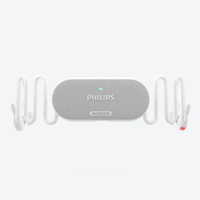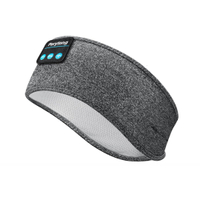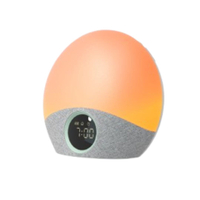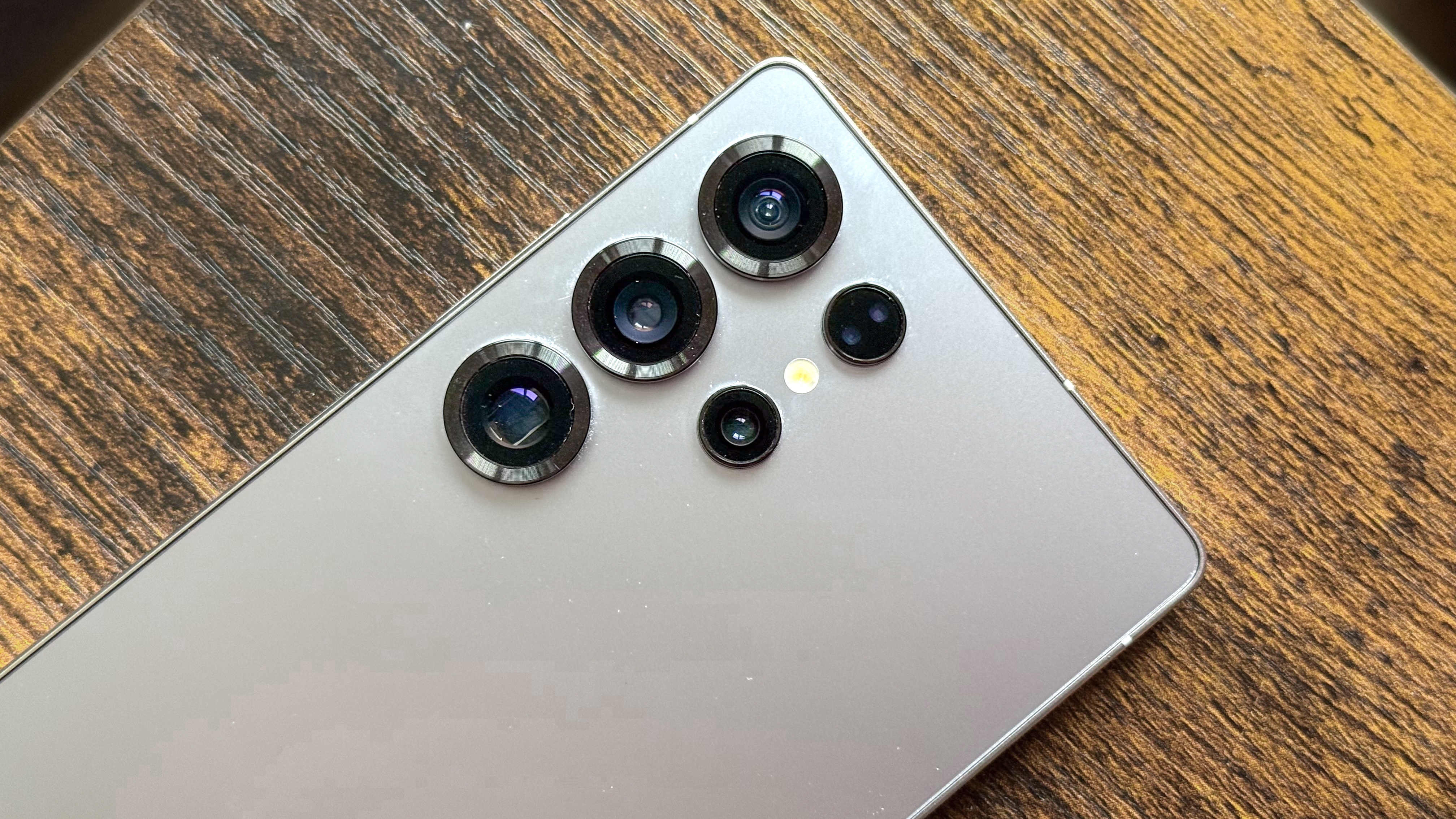38% of Americans can’t sleep in silence, so what sounds help them fall asleep quickly?
Silence is stopping Gen Z from sleeping well — here are the 7 best science-backed sleep sounds
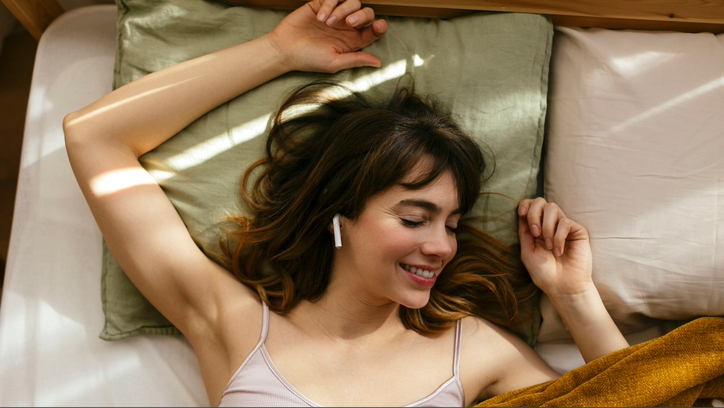
We're no longer keeping quiet around bedtime. More than a third of Americans can't sleep in silence, with Gen Z having the hardest time doing so, according to new research.
A survey of 1,000 Americans carried out by Talker Research found sleep preferences have shifted between generations. The findings show 49% of Gen Z lean on sounds to fall asleep, while just 32% of baby boomers rely on sound aids to sleep.
Constant streaming, relentless notification pings and endless TikTok feeds means we're used to noisy, over-stimulating environments nowadays, and it seems this noisy culture is influencing our sleep habits.
"Guided sleep mediations intend to induce relaxation that prepares the body for sleep"
But heavy metal or political discussion aren't exactly the best lullabies. Fine-tuning our listening and switching to soothing sounds is essential for conducing restorative, peaceful sleep.
Here, we'll dive into which sound tracks are best for sleep, how to use sleep sounds to elevate the quality of your rest and which gadgets can help you do just that.
How can noise help you sleep?
For years we've been searching for ways to block out sound at night. Foam and silicone earbuds are popular sleep companions used to muffle noisy neighbours or a snoring partner.
But now people are getting more experimental and using audio to help them drift off.
There are many ways intentional sleep sounds can help you sleep. First, they can mask more disruptive noise pollution coming from outside your window.
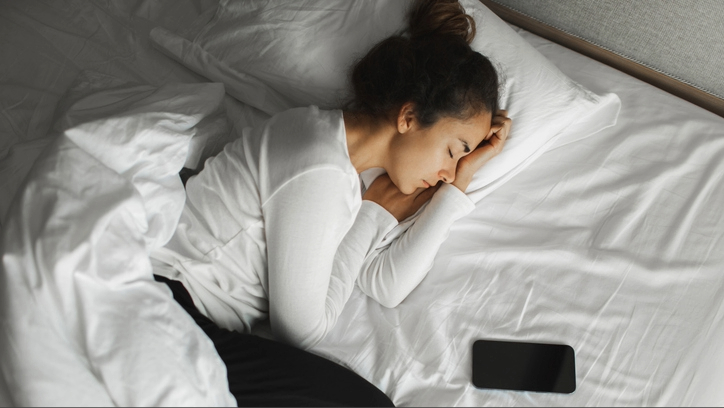
They can also help promote relaxation by distracting you from anxious thoughts, quietening a busy mind before sleep.
Additionally, putting in your headphones and turning on a sleep meditation, white noise or calming music can help you form a consistent nighttime routine.
This routine signals to your body that it is time to wind down, giving you a greater chance of falling asleep fast.
7 of the best sounds for better sleep
There are certain sounds that are proven to help you sleep. Here are a handful of science-backed recommendations…
1. Nature sounds
Falling asleep to the sound of crashing ocean waves, a flowing river, rain, forest ambience or a crackling fire is bliss for many people.
There's plenty of evidence indicating interactions with nature have a positive effect on relaxation and overall well-being.
A study by scientists at the University of Sussex shows the sound of nature influences bodily systems that control the flight-or-fright and rest-digest autonomic nervous systems, which are associated with the brain's ability to relax and, hence, our ability to fall asleep and clock quality ZZZs.
2. Guided meditations
Our team of sleep gurus takes snoozing seriously. From moon breathing to the body scan technique, we've tried and tested countless sleep meditations (yes, it's a tough job).
Navigating the hundreds of sleep meditations on YouTube can be overwhelming. So, how exactly do these meditations work, and which ones do we really recommend following?
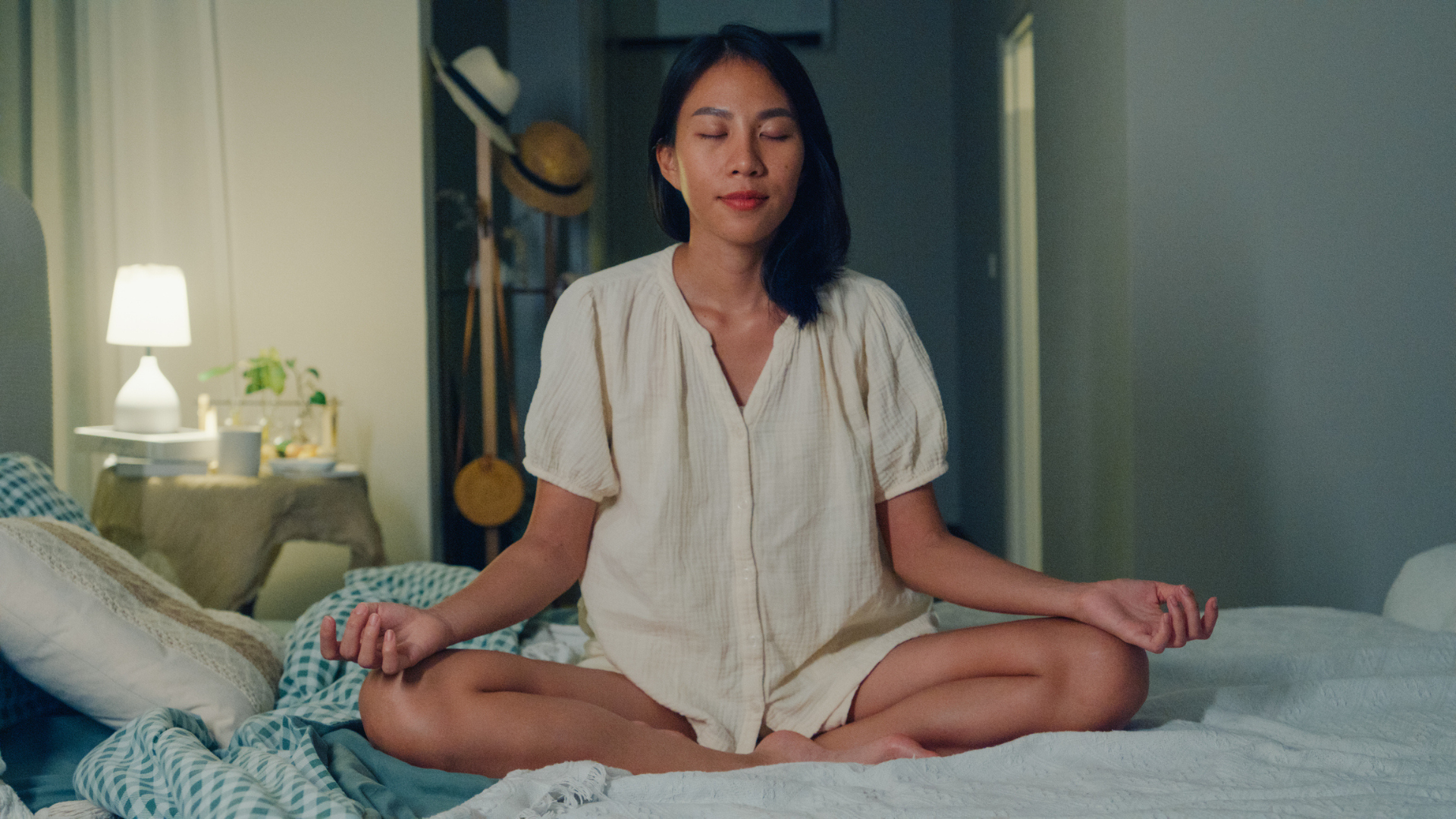
By targeting both anxious thoughts and physical stress symptoms, guided sleep meditations induce relaxation that prepares the body for sleep.
They usually involve the calming voice of a sleep practitioner who helps you focus on the here and now, your breath and bodily sensations so you can let go of worries at bedtime and drift off peacefully.
After testing, we recommend the famous Floating Among The Stars and Sleep Talk Down Guided Meditation by certified meditation teacher Jason Stephenson. These mediations have helped us calm our minds before sleep, no matter how long our to-do list is or how anxious we felt about an early-morning alarm.
- Read more: I tried this fall asleep fast method with 23 million views on YouTube — here’s what happened
3. Sleep podcasts
Many podcast hosts probably don't want you to fall asleep mid-episode. But sleep-specific podcasts are designed to lull listeners to sleep with a combination of quietly-narrated stories, guided meditations and calming audio snippets.
Reading is often lauded as an elite bedtime activity, yet some people can find it too stimulating or demanding, which is no good for dozing off. Hence, a bedtime podcast is a great alternative.
Leading sleep podcasts include Sleep With Me, which features deliberately boring stories read calmly by Drew Ackerman, Sleep Whispers, which, as its name suggests, involves the host reading anything from poetry to Wikipedia pages, in a soothing whisper, and Headspace Sleepcast, which sends you to dreamlands via long, meandering descriptions.
4. Binaural beats
Harnessing the power of physics to help you snooze, binaural beats are an auditory illusion that occurs when two tones of different (but very close) frequency are played simultaneously to each ear through headphones.
The aim of the game here is to slow down brainwave activity and induce alpha wave brain activity. This promotes a calm state of mind, making it easier for you to fall asleep.
You can find binaural beat playlists on both Spotify and YouTube and use them to bag a quick nap during the day or fall asleep peacefully at night.
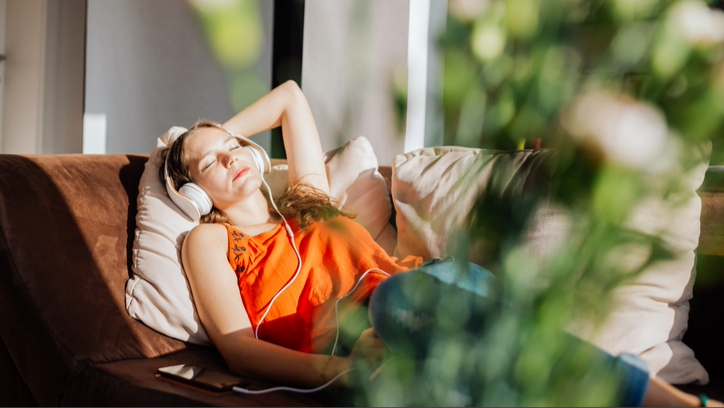
5. White noise
White noise has been around since the 1960s as a popular sleep aid used to soothe adults and babies to sleep, and there's been a particular uptick in interest in recent years with 73.2K posts under #whitenoise on TikTok.
Likened to the sound of a television static, it blends all frequencies across the audible spectrum in equal measure, creating a 'fuzzy' noise. White noise essentially provides a monotonous backdrop that drowns out other sound.
Therefore, white noise is particularly effective for anyone looking to mask a noisy household, disruptive neighbours or a busy city outside your bedroom window.
After prolonged use, your mind will come to associate the sound with sleep, helping you nod off.
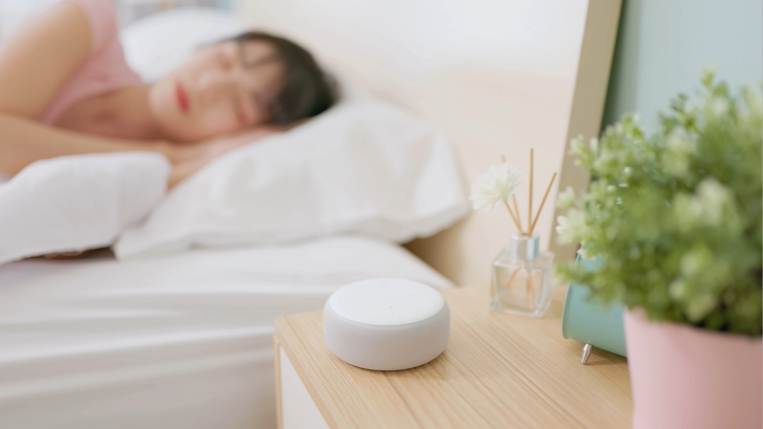
6. Chill-out music
Research shows music can reduce sympathetic nervous system activity and decrease anxiety, blood pressure, heart and respiratory rate.
As such, it has physical and psychological calming effects, promoting muscle and mind relaxation which is essential when it comes to getting quality sleep.
The kind of music you find calming will depend on your music taste. But you'll want to avoid stimulating lyrics and booming basses.
Experts, including Dr Mayank Shukla, generally recommend relaxing classical music or instrumental songs as effective sleep aids.
Wham's Wake Me Up Before You Go-Go wouldn't be our go-to sleep track. But something like Conan Grey's Heather should do the trick.
7. ASMR
ASMR refers to sounds that stimulate an autonomous sensory meridian response and are associated with a euphoric, sensory experience.
From immersive cooking and cleaning videos to hair brushing, whispering and chewing (yuk!), social media is obsessed with ASMR right now. But can these sounds help you sleep?
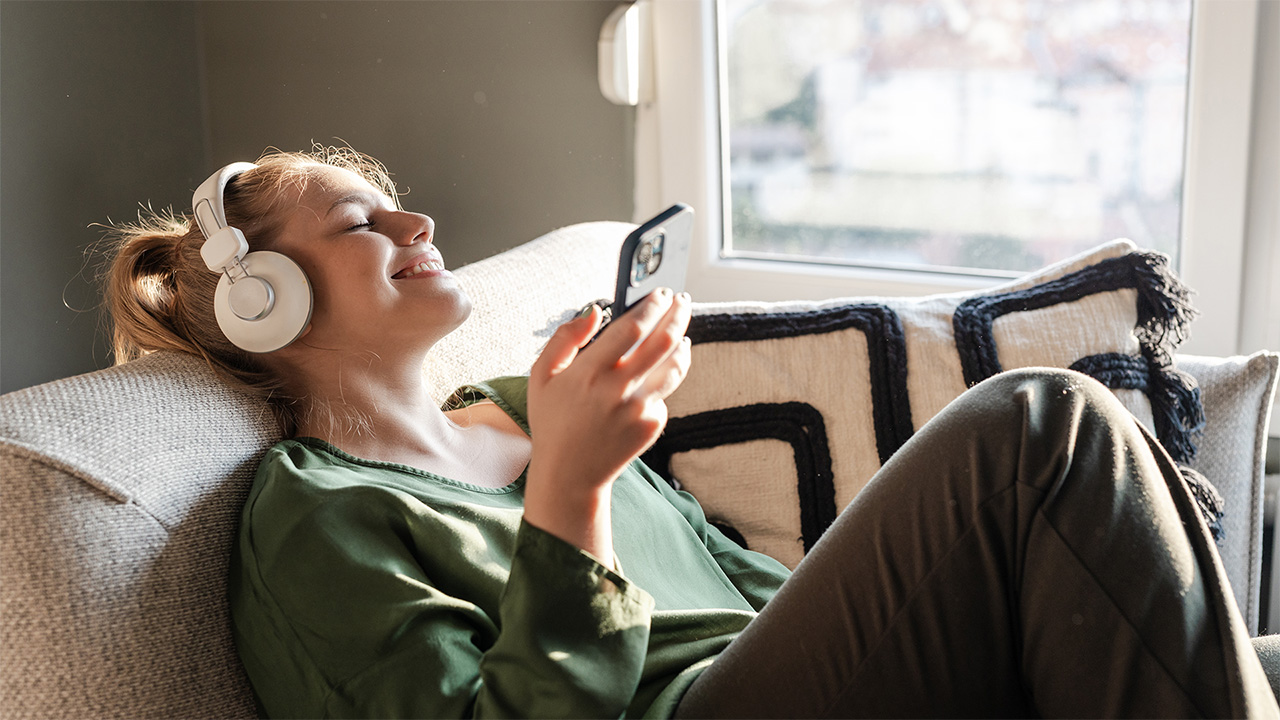
ASMR is said to trigger relaxation, reduce stress and promote feelings of well-being, potentially leading to easier and deeper sleep.
A study published in the Malaysian Journal of Medical and Health Sciences, which used the Pittsburgh Sleep Quality Index to assess the impact of ASMR on sleep, concluded that ASMR stimulation for 14 days can significantly improve sleep quality.
Finding your ideal ASMR soundtrack for sleep will depend on personal preferences. But, if you're looking for a steer, experts at Sleep.com recommend letter pronunciation, whispering, tapping, typing, blowing and scratching sounds
Combine sleep sounds with good sleep hygiene
For these sounds to have the positive effect they promise, you must ensure the rest of your sleep hygiene is on point too.
This will include sleeping on the best mattress and best pillow for your sleep style and sleep needs. Plus, for the best quality rest, you should follow a consistent sleep schedule where you go to bed and wake up at roughly the same time each day.
Regularly cleaning your mattress and sleep space to ensure it is free of irritating allergens and dust mites is also essential for getting a good night's sleep.
The best gadgets for sleep sounds
Whether you want to listen solo or with your partner, there are plenty of bedroom gadgets for sleep sound streaming. These are a selection of deals to shop today...
Philips Sleep Headphones with Kokoon: was $270 now $216 at Kokoon
These thin earbuds are designed to sit comfortably in your ears all night long, no matter your sleep position. Plus they have an audio fade-out feature so they switch off when you're sound asleep. There's 20% off now which translates to a saving of $54 and knocks the price to $216.
Perytong Sleep Headphones: was $29.99 now $15.99 at Amazon
These multi-purpose sleep headphones come embedded in a soft fabric headband, offering ample sound masking. There's dozens of color options to chose from and an impressive 47% off cuts the price to $15.99. You don't want to miss this Amazon bargain.
Momcozy Sunrise Alarm Clock: was $49.99 now $39.99 at Amazon
The Momcozy sunrise alarm clock also acts as a sleep sound machine that can help you and your partner drift off. It is complete with a library of snooze sounds including 17 nature sounds and 3 white noise options. With 20% off now, you can get this gadget for $39.99. Plus, you'll be able to elevate your morning routine alongside your bedtime routine, thanks to the sunrise simulation feature and keep your phone out of the bedroom.
Sign up to get the BEST of Tom's Guide direct to your inbox.
Get instant access to breaking news, the hottest reviews, great deals and helpful tips.

Eve is a PPA-accredited journalist with an MA in Magazine Journalism from Cardiff University. She is a Sleep Staff Writer at Tom’s Guide and has four years’ experience writing health features and news. She is particularly interested in the relationship between good sleep and overall health. At Tom’s Guide Eve is responsible for coverage and reviews of sleep tech and is our smart and cooling mattress specialist, focussing on brands such as Eight Sleep and Sleep Number. She also covers general mattress reviews, seeks out the best deals to produce tried-and-tested buyer's guides for sleep accessories and enjoys writing in-depth features about sleep health. She has been involved in rigorous testing procedures for mattress reviews in our Sleep Studio and has interviewed experts including sleep doctors and psychologists. When not covering sleep at Tom's Guide, Eve enjoys writing about health and fitness, food and culture.
You must confirm your public display name before commenting
Please logout and then login again, you will then be prompted to enter your display name.
